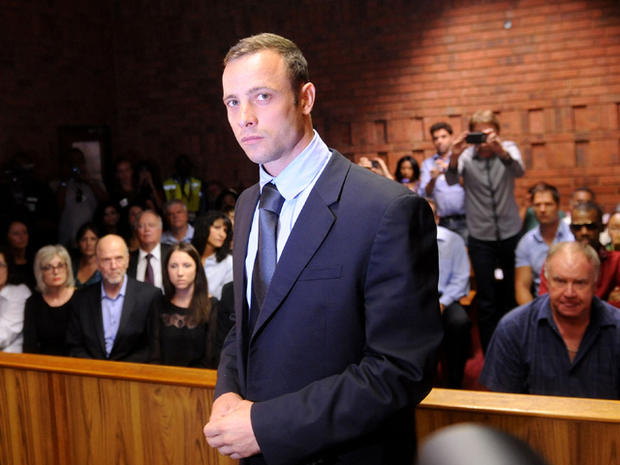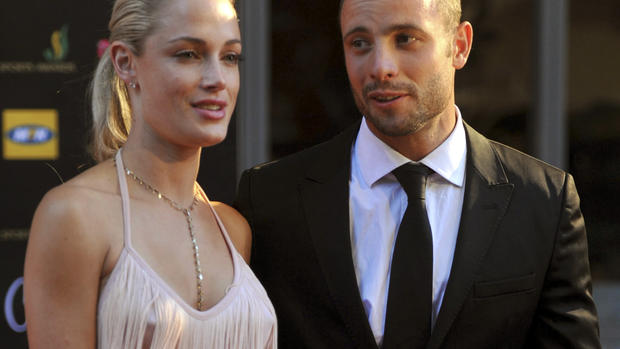Oscar Pistorius: Olympic athlete's bail hearing nearing decision
(CBS/AP) PRETORIA, South Africa - A South African magistrate is expected to decide this morning whether Oscar Pistorius, the Olympic and Paralympic sprinter charged with premeditated murder of his girlfriend, will be allowed to leave jail while awaiting trial.
PICTURES: Olympic athlete charged with murder
Pistorius is charged with one count of premeditated murder in the Valentine's Day killing of 29-year-old Reeva Steenkamp. He says he accidentally shot her, thinking she was a dangerous intruder inside his home, lurking in a toilet stall off his bedroom.
Prosecutor Gerrie Nel called Pistorius' story improbable and argued that Pistorius did not have to have planned the killing for days in advance for it to be premediated.
"He planned it that night when she (Steenkamp) locked herself in (the toilet)," Nel said when Chief Magistrate Desmond Nair asked why Pistorius hadn't staged a break-in at his home to make his story look more believable. "The fact that we have only one survivor of that tragic night is difficult for the state."
Barry Roux, Pistorius' defense lawyer, brought up culpable homicide as a possible charge for the first time in the case when answering questions from the magistrate.
"He did not want to kill Reeva. He had no intent to kill Reeva," Roux said.
Roux said it was impossible for Pistorius, as famous as he is and with his prostheses, to escape South Africa before trial and bail should be granted.
"Let me tell you how difficult it is for this man to disappear from this world," Roux said.
Nel earlier countered that everyone, whether disabled or famous or otherwise different from the majority, should be treated equally under the law. Nel noted that WikiLeaks founder Julian Assange is famous but is now holed up in the Ecuadorean Embassy in London to avoid extradition to Sweden to face sex-related charges.
Nair will decide if Pistorius can be freed with conditions or if he is held until trial. Pistorius faces the sternest bail conditions in South Africa because of the seriousness of the murder charge, meaning his defense lawyers have to prove there is an "exceptional" reason for him to be freed.
Stephen Tuson, an adjunct law professor at the University of Witwatersrand in Johannesburg and a practicing attorney, told The Associated Press that poor health, a weak state case or a disability could be reasons to grant bail to a person accused of murder. But the "exceptional" circumstances Pistorius would have to prove to be freed are not established absolutely by law and are applied considering the individual merits of each case.
The matter of exceptional reasons "is not defined," Tuson said. "We've had to have this concept expanded by the courts on a case by case basis."
Pistorius' defense dedicated much of its argument in the bail hearing to questioning the state's case against Pistorius and trying to discredit the police investigation into Steenkamp's shooting. Lead investigator Hilton Botha was removed from the case Thursday following his bungled testimony for the prosecution. He was replaced by the South African police's top detective, Vinesh Moonoo -- who was in court Friday.
Roux also stressed Pistorius' disability Friday and said it was one of the reasons why he couldn't easily flee the country.
"He cannot, cannot go unnoticed through airport security. When he goes through the security at the airport, there's every time a commotion because the system would react," Roux said. He added that Pistorius also needs medical treatment for his stumps and has to have his prostheses adjusted on a monthly basis.
In arguing against bail, Nel sought to portray Pistorius as a spoiled celebrity with an inflated sense of self who believed he was above the law. Nel also said selfishness could be driving expressions of remorse by suspects such as Pistorius.
"All that I feel sorry for is myself," Nel said of Pistorius. "I've shot her and my career is done."
Before the proceedings began, Pistorius' longtime coach Ampie Louw said that he is considering putting his runner back in training if he is granted bail to allow him to "get his mind kind of clear."
Louw said he realizes that the Olympic athlete might not be emotionally ready to give any thought to running.
"The change is that he is heartbroken, that is all," Louw said. "For me it is tough to see that. Not to be able to reach out and sit next to him and say 'Sorry, man, it was a terrible accident.' But I cannot do it, I must just sit here in court and that's all."
"The sooner he can start working the better," said Louw, who was the person who convinced the double amputee to take up track as a teenager a decade ago.
Pistorius was held at a police station in Pretoria since last week, but suspects who are denied bail are typically held in a prison. Roux argued on Thursday that the evidence backs Pistorius' statement that he shot through a toilet door at his home because he mistook Steenkamp for an intruder, killing her by accident.
"I think there will be a level of shock in this country if he is not released (on bail)," Roux said in court.
Opposing bail, Nel argued that Pistorius was too willing to shoot. The prosecution says Pistorius planned to kill his model girlfriend after an argument in the early hours of Valentine's Day.
"The reason you fire four shots is to kill," Nel said.
Complete coverage of Oscar Pistorius on Crimesider

